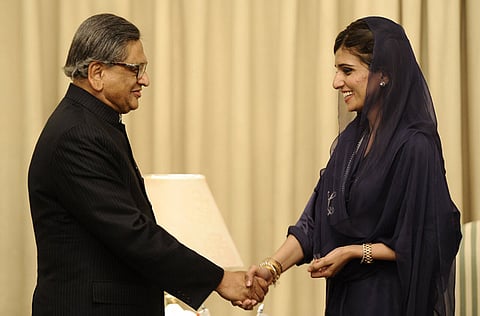India, Pakistan likely to sign visa deal
Neighbours close in on a visa agreement that will boost business travel and trade

New Delhi: India’s Foreign Minister S.M. Krishna arrived in Pakistan for his first visit in two years Friday as the neighbours close in on a visa agreement that will boost business travel and trade across their border.
Krishna will hold discussions with his Pakistani counterpart Hina Rabbani Khar during the three-day trip that will also focus on the threat of terrorism, according to an Indian foreign ministry official, who asked not to be identified as he is not authorised to discuss the matter.
Krishna is expected to meet President Asif Ali Zardari, the official said.
“We are only seeing very small incremental steps,” G. Parthasarathy, a former Indian High Commissioner to Pakistan, said in a phone interview.
“We are still a long way from any big ticket announcements but given there has not been a deterioration in the relationship that counts as progress.”
India and Pakistan’s foreign ministers are meeting for the second time since peace talks resumed last year. Five years of dialogue that had strengthened trade, transport and cultural links were halted following the attacks on Mumbai in 2008 by Pakistani gunmen, in which 166 people died.
Since the resumption, the nuclear-armed rivals who have fought three wars have made progress normalizing their economic links.
Resolving long-standing territorial disputes such as Kashmir remains hobbled by distrust.
“We are committed to finding solutions of all issues that have beset our relationship through peaceful, bilateral dialogue,” Krishna said after landing in Islamabad.
Both governments have been weakened at home.
Pakistan’s Ashraf faces possible contempt proceedings in the country’s top court over his refusal to seek the resumption of graft investigations against Zardari in Switzerland, an issue that led to the ouster of his predecessor.
Indian Prime Minister Manmohan Singh, meanwhile, has faced almost two years of corruption allegations and policy revolts within his ruling alliance.
Singh is unlikely to travel to Pakistan this year, the foreign ministry official said. He accepted an invitation from Zardari in April, saying he’d go at a mutually convenient date.
Singh’s trip would be the first by an Indian premier since January 2004 when former Prime Minister Atal Bihari Vajpayee visited Islamabad for talks with then Pakistani President Pervez Musharraf.
While the countries first agreed to grant more business visas in November, the pact hasn’t been signed. Under the proposals, company executives will be issued one-year, multiple-entry visas for 10 cities of their choice, the Indian Express reported in May.
Tourist visas may be issued for the first time, it said. Hasan-Askari Rizvi, an independent political and military analyst in Lahore, said he doesn’t expect any breakthrough from the talks after a meeting last week on the margins of a summit in Tehran between Singh and Zardari failed to produce meaningful results.
He said the dialogue would again be dominated by India’s demand its neighbour prosecute those responsible for the Mumbai carnage.
Sign up for the Daily Briefing
Get the latest news and updates straight to your inbox



